Oman is the location for MENOG 17 this April. So we take the opportunity to see how things looks in the Sultanate and compare it to other countries in the region.
From 19-20 April 2017, the MENOG 17 Meeting takes place in Muscat, Oman. At the meeting, operators, academics, regulators and other stakeholders will come together to discuss Internet developments and best practices as well as share their experiences with colleagues from across the Middle East and beyond. The last MENOG Meeting to take place in Oman was in 2011, so this is a good time to look at how Oman is doing from a RIPE NCC perspective and compare it to other countries nearby. A recent article focusing on Iraq can provide a further comparison point.
Here we use data available at the RIPE NCC to look at Oman and compare it to neighbouring Saudi Arabia and the United Arab Emirates as well as Kuwait. Neighbouring Yemen has remained static with five LIRs for the past three years. Figures in the table below for area and population are from Wikipedia.
| Country | Population | Area (km2) | LIRs |
|---|---|---|---|
| Oman | 4,573,075 | 309,500 | 11 |
| United Arab Emirates | 9,856,000 | 83,600 | 73 |
| Saudi Arabia | 33,708,001 | 2,149,690 | 104 |
| Kuwait | 4,183,658 | 17,818 | 39 |
Please note that this table is a snapshot of the situation as seen on 4 April 2017. However, in most cases we will also mention a link to the most up-to-date information.
Oman at a glance
| Number of ASNs assigned | 10 |
| Number of Local Internet Registries (LIRs) | 11 |
| Number of IPv4 allocations | 30 |
| Number of IPv4 assignments | 0 |
| Number of IPv4 addresses allocated | 846,848 |
| Number of /22s allocated from the last /8 | 7 |
| Number of LIRs with IPv6 allocations | 7 |
| Size of IPv6 allocations (/32s) | 14 |
| Number of IPv6 assignments | 0 |
| RPKI with route object authorisation (ROAs) | 0 |
Membership growth
In Figure 1, you can see the growth of the number of Local Internet Registries (LIRs) in Oman and comparison countries from 2010 to 2017. As of April 2017, there are 11 LIRs registered in Oman, with one LIR registering in each of the last six years.
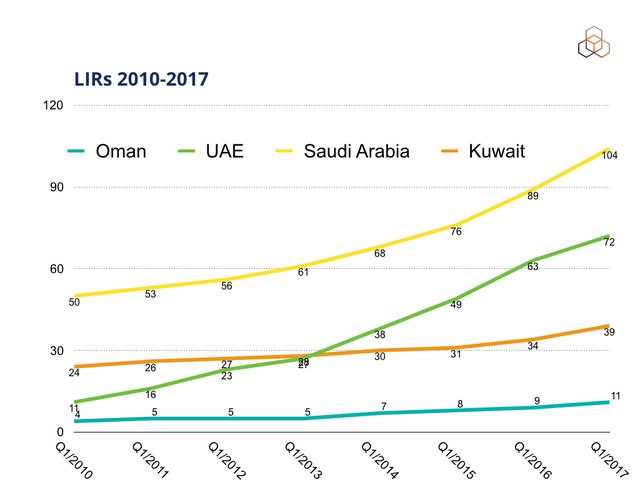
Figure 1: Number of LIRs in Oman and comparison countries from 2010-2017
For comparison, Figure 2 shows the growth in the number of all LIRs registered with the RIPE NCC since 2008. There are currently over 15,700 LIRs registered with the RIPE NCC. Note that the numbers for 2017 only contain data to the end of March.
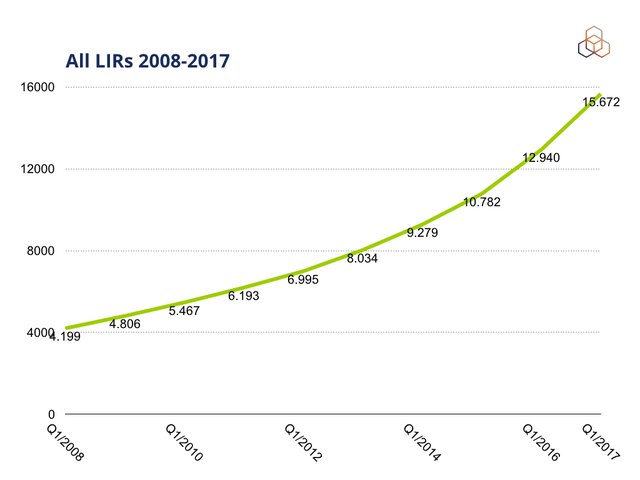
Figure 2: Number of all LIRs in the RIPE NCC service region from 2008-2017
The next figure shows the age of the LIRs in Oman. You can see that of the 11 LIRs in Oman, over half of them have been established in the last four years. Figure 3B below that shows the age of all LIRs in the RIPE NCC service region.
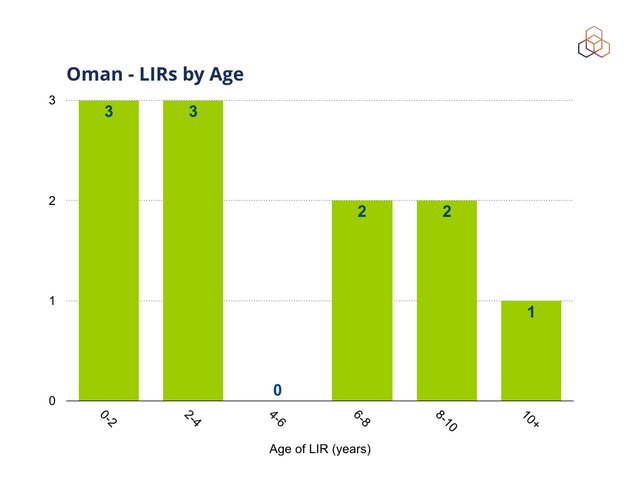
Figure 3: Age of LIRs in Oman
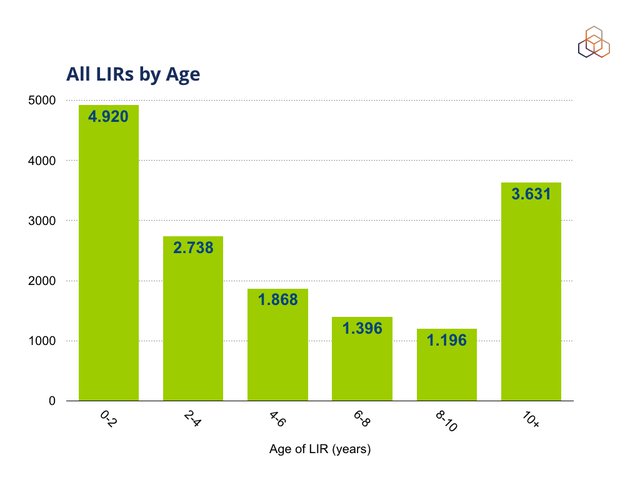
Figure 3b: Age of all LIRs in RIPE NCC service region
IPv6 Deployment in Oman
IPv6 RIPEness is a rating system that awards stars to LIRs in the RIPE NCC service region depending on indicators of IPv6 preparedness. Stars are awarded for:
- Having an IPv6 allocation or assignment from the RIPE NCC
- Making the IPv6 prefix visibility in the Routing Information Service (RIS)
- Having a route6 object registered in the RIPE Database
- Having reverse DNS delegation set up for the IPv6 allocation
Figure 4 shows the situation in Oman. You can see that of the 11 LIRs in Oman, four of them have yet to receive an IPv6 allocation while four have yet to do anything with their allocation. There are no four-star LIRs in Oman at the moment, but we hope this will change in the near future.
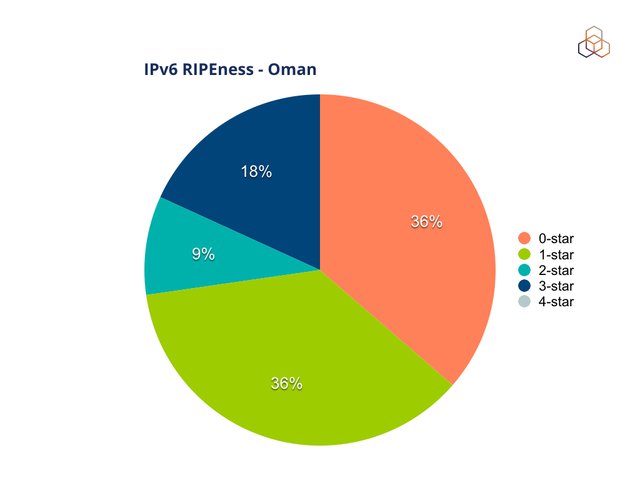
Figure 4: IPv6 RIPEness in Oman
In Figure 5, you can see the situation for all LIRs in the RIPE NCC service region. 75% of all LIRs have an IPv6 allocation, and around 46% have started using it one way or another (by meeting one of the criteria listed above).
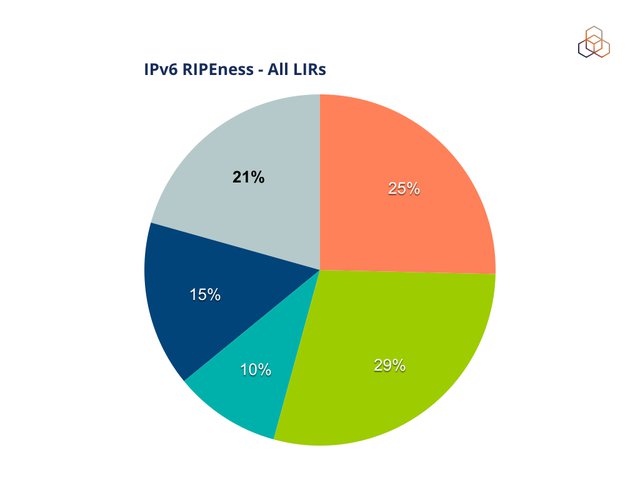
Figure 5: IPv6 RIPEness for all LIRs
In Figure 6, we show the percentage of ASes announcing one or more IPv6 prefixes in Oman and the countries we compare it with. You can find the current status of these countries using the IPv6 Enabled Networks tool. This tool also allows you to search for other countries or regions worldwide.
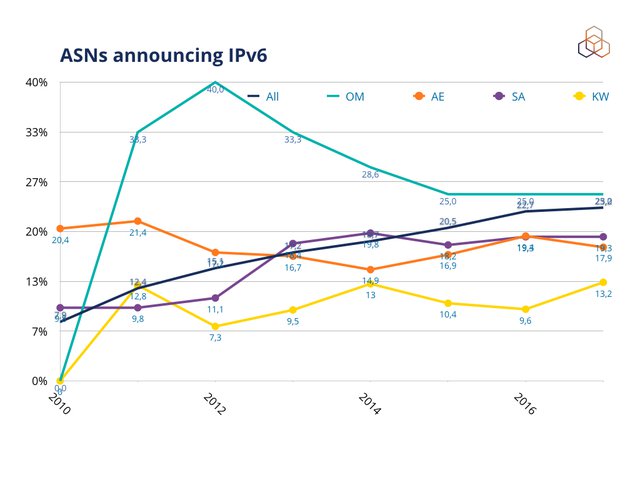
Figure 6: ASes announcing one or more IPv6 prefixes in Oman and comparison countries
Country Routing Statistics
Figure 7 visualises the development of the IPv4 and IPv6 prefixes and ASes in Oman over time.
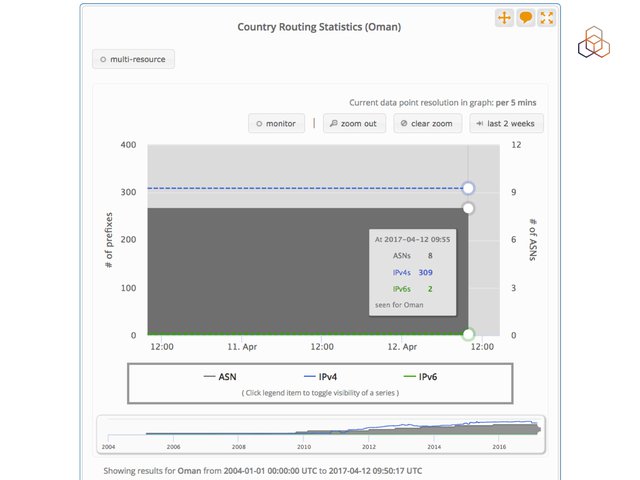
Figure 7: RIPEstat country routing statistics in Oman
You will notice that the number of IPv6 prefixes and the number of ASNs in this widget are not consistent with the number shown in the table above. The table shows those allocations and assignments made by the RIPE NCC to organisations registered in Oman. The RIPEstat widget on the other hand shows what's actually happening in the real world: The 30 IPv4 allocations made by the RIPE NCC have been de-aggregated into 309 individual prefixes that are announced by 8 ASNs (instead of the 10 ASNs assigned by the RIPE NCC to organisations in Oman).
You can see the current status in the RIPEstat country routing widget. You can also use that widget to compare multiple countries.
RIPE Atlas
RIPE Atlas is a global network of probes that measure Internet connectivity and reachability, providing an unprecedented understanding of the state of the Internet in real time. The more probes that are distributed and connected worldwide, the more useful data can be collected that can then be used by network operators and researchers to analyse the state of the Internet.
The embedded RIPEstat widget below shows the number of RIPE Atlas probes in the region. Green dots indicate connected probes, yellow dots show disconnected probes and red dots indicate those that are abandoned (i.e., not connected for more than three months).
If you have a RIPE Atlas probe, please double-check it is connected properly so that the community can benefit from the data it produces.
You will see below that the four connected probes in Oman are all located around Muscat.
RIPEstat widget will be rendered here
Figure 8 shows the actual number of RIPE Atlas probes in Oman.
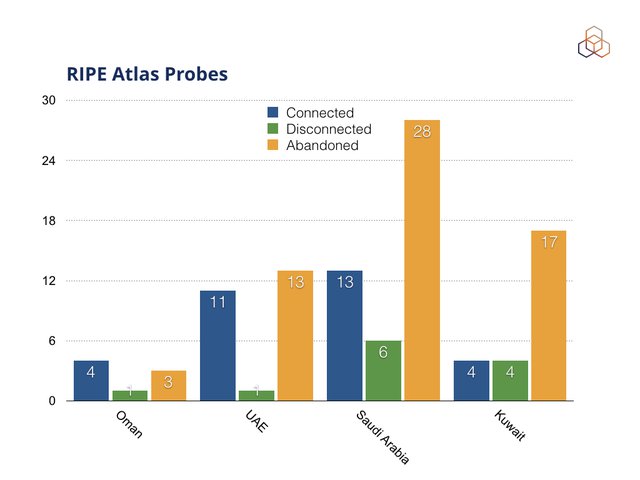
Figure 8: Number of RIPE Atlas probes in Oman and comparison countries
Participation at the General Meeting
The RIPE NCC General Meeting (GM) takes place from 10-12 May 2017, and we hope to see some registrations from our members in Oman and from the Middle East region more generally. This important meeting will see members vote on the RIPE NCC Charging Scheme for 2018 as well as elect three members to the RIPE NCC Executive Board. In the past four years, vote registrations for Oman have ranged from zero to two. We currently have no registrations for Oman (there are two for UAE, one for Saudi Arabia and none for Kuwait), so we encourage you to register in the coming weeks. You can see the country voter registration table on the GM homepage. There is also a new GM video explaining how you can get involved and cast your vote, even if you are participating remotely.
Local Networking Communities
As noted above, the Middle East Network Operators Group (MENOG) offers a great way for operators from Iraq to connect with the networking community from their own country and the wider Middle East region. The MENOG mailing list provides regular updates on what's going on in the Middle East and allows operators to discuss Internet-related issues in the region.
The MENOG 17 Meeting takes place in Muscat, Oman from 19-20 April and will feature presentations from local Internet experts as well as representatives from the global Internet community.
The RIPE NCC is also working to engage academic communities with the Internet community in the Middle East, including in Oman. Today, Hisham Ibrahim published an article outlining the work that the he and his colleagues in our Dubai office have been doing to bridge the gap between the academic community and the Internet industry.
Conclusion
Oman has a relatively small number of LIRs compared to other countries in the region, although there are signs that this is changing with over half of the LIRs joining in the past four years. There is work to be done in encouraging IPv6 deployment in the country, and this is something the RIPE NCC can help with through in-person training (see the three-day IPv6 for ISPs Workshop taking place before MENOG 17), online training including the RIPE NCC Academy, as well as the upcoming IPv6 Roadshow in Oman and the Train-the-Trainer Program we initiated in the MENOG region.
If there is other information you'd like to see, or you have specific comments on the Oman information provided, please let us know in the comments below.

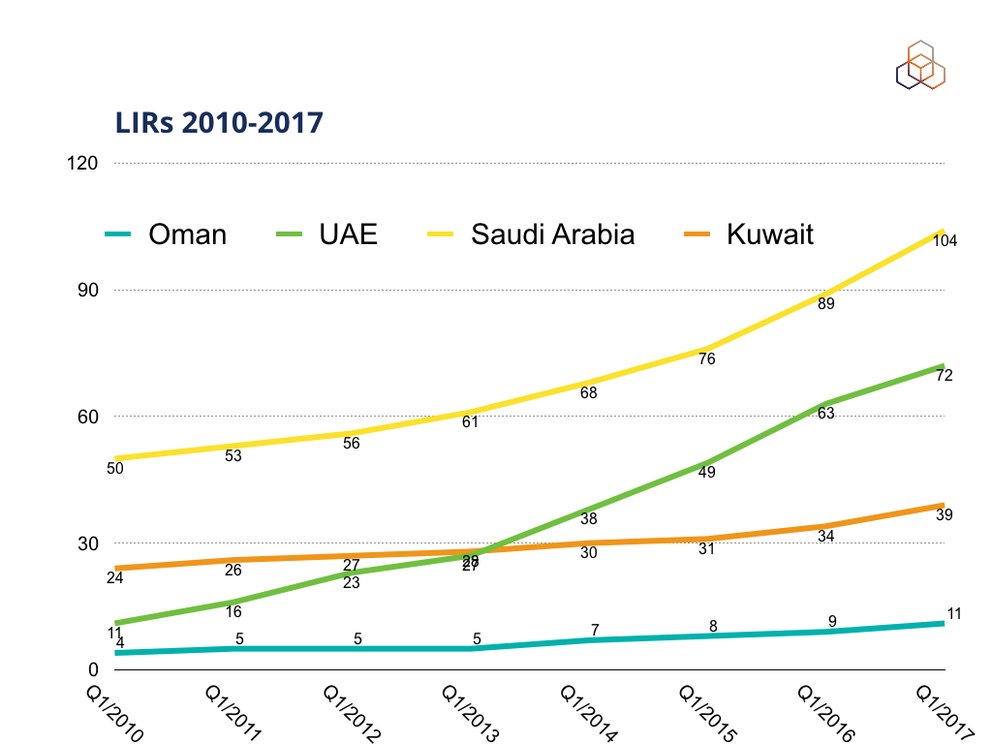
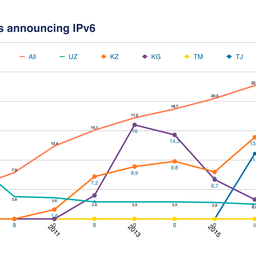
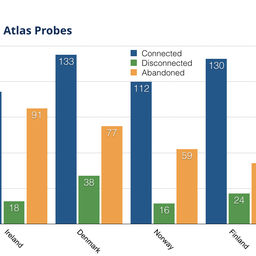
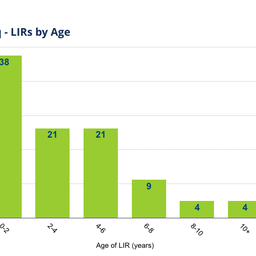
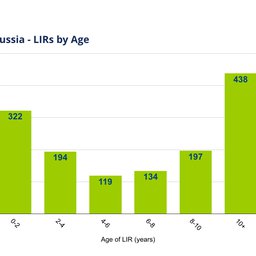
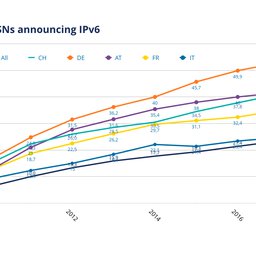



Comments 0
The comments section is closed for articles published more than a year ago. If you'd like to inform us of any issues, please contact us.